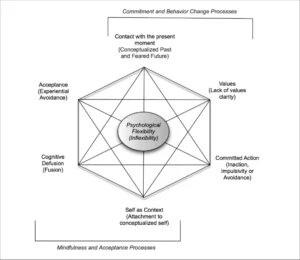Acceptance and Commitment Therapy (ACT, pronounced like the word “act”) is a type of behavior therapy that involves 6 related processes that work together to promote greater psychological flexibility.
So, what exactly is psychological flexibility? Essentially, it can be described as your ability to experience whatever is present for you, such as thoughts, feelings, sensations, and memories, without trying to defend yourself against them. This allows them to just be what they are, as they are. With greater psychological flexibility, you are able to more readily accept what is out of your control (including your own thoughts at times) and commit to actions that lead to a rich, full, and meaningful life.

Psychological Inflexibility
For example, if you make a mistake at work and think to yourself that you’re a failure and you always will be, that will probably make you feel pretty hopeless. You might want to defend against that challenging thought or hopeless feeling by engaging in behaviors to avoid actually experiencing them. You may indulge in food or substances, isolate yourself instead of reaching out for support, mindlessly scroll social media, or act more impulsively than you normally would. You also might get so stuck in that thought and feeling that you can’t move on from it.
Avoiding or attaching to your experience will likely prevent you from engaging in behaviors that are aligned with what is truly meaningful to you. This is an example of how avoiding or attaching to your experience contributes to psychological inflexibility.
Psychological Flexibility
 In the above example, let’s say one of your core values is your health. So after making a mistake at work, you think you’re a failure and you feel hopeless. Instead of trying to push this experience away or get stuck in it, you allow yourself to simply experience it. Then, instead of engaging in behaviors that aren’t aligned with your value of health, you choose to go for a walk or cook yourself a nourishing meal.
In the above example, let’s say one of your core values is your health. So after making a mistake at work, you think you’re a failure and you feel hopeless. Instead of trying to push this experience away or get stuck in it, you allow yourself to simply experience it. Then, instead of engaging in behaviors that aren’t aligned with your value of health, you choose to go for a walk or cook yourself a nourishing meal.
Afterwards, you notice that you feel more hopeful and like less of a failure and realize that it was just a temporary experience, not ultimate reality. This is an example of how acceptance and values-based actions can promote psychological flexibility!
Curious about what the 6 core processes of ACT are and how to apply them to your life? Here is an image of the ACT hexaflex that represents the 6 processes that promote psychological flexibility. The hexaflex also includes the corresponding opposite processes that generate psychological inflexibility. As you can see the processes are divided into two groups: acceptance and mindfulness practices and commitment and behavior change processes. Both groups include contact with the present moment and self as context because these two processes contribute to the other four processes.
How to Apply the ACT 6 Core Processes to Your Life
Contact with the Present Moment
- Consciously connect with and engage in whatever is happening in this moment
- Flexibility brings your awareness to either your external environment or internal experience, or to both simultaneously
Explore:
- How do you typically connect to the present moment?
- What takes you out of the present and into memories of the past or anticipation of the future?
Self as Context
- Taking the seat of the observer or witness to your mind
- Being aware of your thinking, feeling, sensing, or doing at any moment
Explore:
- What do you find hard about being the observer of your experience?
- How does taking the seat of the witness impact how you manage challenging thoughts, feelings, sensations, or events?
Acceptance and Mindfulness Processes:

Acceptance
- Opening yourself up to make room for painful feelings, sensations, thoughts and urges.
- Instead of fighting, resisting, running from, or getting overwhelmed by them, we open up and let them just be.
- *Note: this does not mean you like, want, or agree with them, you are simply making room for them.
Explore:
- What experiences do you find yourself avoiding? Is it a particular feeling, thought, or sensation?
- What would happen if you made room for this painful or challenging experience?
Thought Defusion
- To step back and separate or detach from your thoughts, images, and memories
- Being able to see your thoughts for what they are – nothing more or less than words or pictures
Explore:
- What happens when you clutch tightly to your thoughts?
- What might happen instead if you held them lightly, allowing them to come and go as if they were cars driving past outside your house?
Commitment and Behavior Change Processes
Values
- Deep down, what do you want your life to be about? What truly matters to you in the big picture?
- Values describe how we want to behave and what we want to prioritize on an ongoing basis. Chosen values can serve as a compass during challenging moments to guide you back to the direction you want to go.
Explore:
- What do you want to stand for?
- What do you want to be remembered for at the end of your life?
- What areas of your life do you feel more or less aligned with your values?
Committed Action
- Taking effective action, guided by your values.
- This involves “doing what it takes” to live by your values despite experiencing pain and discomfort.
Explore:
- What actions in your life are bringing you closer or farther away from the life you want to live?
- If your values are a compass, what actions do you need to take to move in the direction of value-based living?
As a counselor, I have found that ACT provides my clients with tools and practices to develop more psychological flexibility around challenging experiences. This often looks like my clients breaking a cycle of maladaptive coping and getting them more aligned with what they truly want in life. I have had clients express feeling a greater sense of freedom and authenticity as they apply the core processes of ACT to their life.
How we can help
Interested in working with a supervisor who incorporates ACT? Book a free 20-minute phone consultation today!
Author Bio

Juliette Brown is a student intern and a provider for the affordable counseling program at Catalyss Counseling. She works with adults with depression, anxiety, and grief to find new ways of thinking, feeling, and acting so they can experience greater joy and authenticity in their everyday lives. Follow Catalyss Counseling on LinkedIn, Facebook and Instagram.



